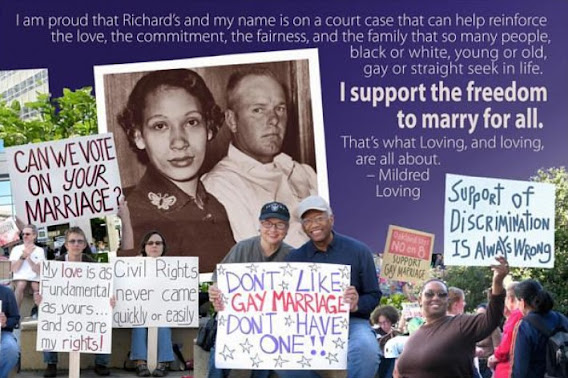Mildred Loving helped end the ban on interracial marriage when she married her white husband, Richard Loving.
On June 12, 1967, the U.S. Supreme Court unanimously struck down as unconstitutional 16 state bans on interracial marriage. The ruling came in a lawsuit brought by Richard and Mildred Loving, a white man and black woman who had been jailed for being married to each other. Born Mildred Jeter, she’s mostly known by the name she took when she — a black woman living in segregated Virginia — dared to break the rules by marrying a white man named Richard Loving.
The union landed the
Loving’s in jail, and then before the U.S. Supreme Court, and finally in the
history books; the court ruled in favor of the couple, overturning laws
prohibiting interracial unions and changing the face of America.
A 28-year-old Phil
Hirschkop was just a few months out of law school when he overheard a professor
discussing the Loving’s case. Hirschkop was convinced the Supreme Court was
ready for change, too — but the right case had to come before the justices,
free of any legal loopholes the state could seize upon. The Loving’s presented
such a case.
Hirschkop argued
that the laws must treat each citizen equally, and that “when a law is based on
race, it is immediately suspect and the burden is shifted to the state to show
there is a compelling interest to have that sort of racial differentiation.”
It took nine years,
but the Loving’s were finally—legally—home. They built a house together on an
acre of land Richard’s father had given them. Eight years later, the Loving’s
were hit by a drunk driver while driving home on a Saturday night. Richard was
killed. Mildred never remarried, but she stayed in the home Richard built
surrounded by family and friends.
There is little doubt about Mildred and Richard’s legacy. There’s an unofficial celebration on June 12, called “Loving Day,” honoring the anniversary of the Supreme Court decision and multiculturalism. Loving v. Virginia declared anti-miscegenation laws to be illegal across the United States, but perhaps, even more importantly, it’s the legacy of an ever-lasting love—a love that triumphed even in the face of persistent hate.




Comments
Post a Comment